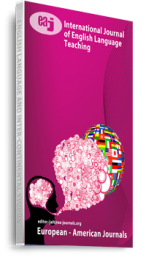This factorial experimental study investigated the effect of tasks (holistic dan discret) and learning styles (visual, auditory, dan kinaesthetic) on students’ English Writing Performance (EWP). The experiment applied factorial design 2×3 with amount of sample 150 students taken randomly stratified from three junior high schools at Buton Regency, Indonesian during school-year 2014/2015. The research hypotheses were tested using two ways of analysis of variance and continued with Tuckey test. The results of the research revealed that: (1) EWP of students given holistic tasks was higher than EWP of students given discrete tasks; (2) statistically, there was no significant difference on EWP of visual students, auditory students, and kinaesthetic students; (3) there was any interaction effect on giving tasks and learning styles on students’ EWP; (4) visual students given holistic tasks reached higher EWP than those given discrete tasks; (5) auditory students given discrete tasks attained higher EWP than those given holistic tasks; and (6) kinaesthetic students given holistic tasks achieved higher EWP than those given discrete tasks.
Keywords: Discrete, Task, Writing Performance, holistic, learning styles

